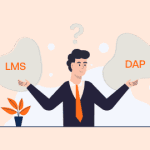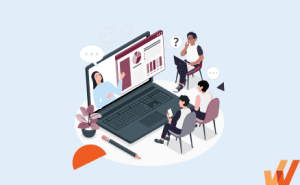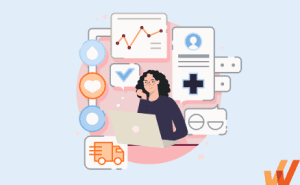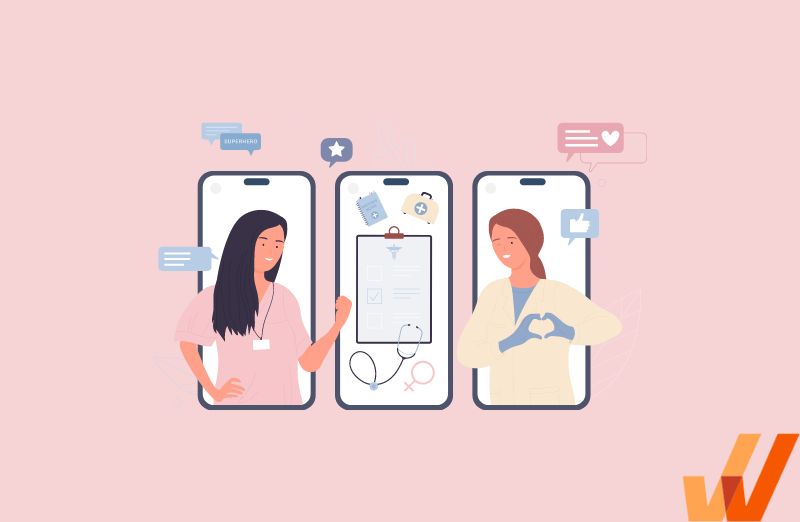12 Best Healthcare LMS For Hospitals & Medical Practices (2024)
- Published: April 18, 2023
- Modified: April 29, 2024

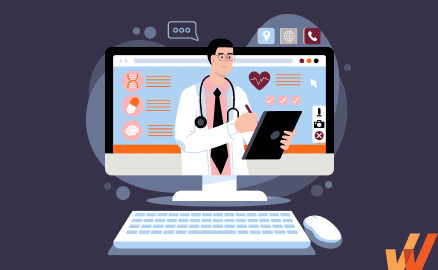
A learning management system (LMS) is an essential tool for L&D professionals in the healthcare sector, designed to streamline the creation, deployment, and management of healthcare training programs across nurses, doctors, administration, technicians, and other staff.
Healthcare LMS systems are crucial for efficiently onboarding new staff, continually training clinicians, and monitoring their progress to upskill hospital staff and ensure high standards of patient care.
However, with many LMS options tailored to healthcare practices and hospital networks, choosing the right one requires research and evaluation. Each system offers unique features and capabilities, often tailored to the specific needs of healthcare environments.
As you begin your search for the perfect healthcare LMS, you’ll likely encounter several key considerations:
- Does the LMS support multiple content formats, such as videos, training documents, slide decks, and audio?
- Can it integrate and import resources from your existing LMS or traditional healthcare training delivery methods?
- Does it provide a comprehensive library of native courses and certifications relevant to healthcare?
- Are the courses accredited by healthcare regulators?
- What level of customer support does the LMS provider offer?
This article explores the unique features of healthcare-specific LMS solutions, distinguishes them from generic corporate LMS platforms, and introduces you to the best LMS providers tailored for the healthcare industry.
What Is a Healthcare LMS?
Healthcare learning management systems are digital training platforms designed to help healthcare organizations—hospitals, medical device companies, practices, etc. — create personalized resources, deliver online training courses and modules, meet industry regulation and compliance needs, onboard and train their staff, and track their performance.
What are the best healthcare LMS providers?
- Relias Healthcare LMS
- Docebo
- Absorb LMS
- Tovuti LMS
- TalentLMS
- Trakstar Learn
- Cornerstone Learning
- HealthStream Learning
- EthosCE LMS
- CareAcademy
- MedTrainer
- Forma LMS
Before we start, we want to introduce you to Whatfix.
Whatfix isn’t an LMS, it’s a digital adoption platform (or DAP) that uses interactive, hands-on training and support content to guide and support your healthcare employees on your EHR software, patient management systems, and other core digital hospital processes and procedures in the flow of work.
With Whatfix, your healthcare workers can fully utilize your EHR and patient management systems and business processes to maximize productivity and drive healthcare transformation.
12 Best Healthcare LMS in 2024
The best healthcare LMS vendor depends on your learning requirements, existing technology stack, workforce characteristics, and more.
With that in mind, here are the best healthcare-specific LMS providers to train and develop your healthcare staff, with review ratings from public review websites, pricing information, an overview of each platform – to support you when shortlisting and evaluating vendors in your healthcare LMS buying journey.

1. Relias Healthcare LMS
- G2 Rating: 4.2/5
- Pricing: Custom pricing based on organization needs.
Relias helps healthcare organizations create learning and assessment programs and fill knowledge gaps across the workforce. It offers a large native content library of 5,000+ courses and over 100+ course libraries on everything from central sterile functions to wound assessment. Relias’s courses are assessed at least once every three years by 135+ accrediting bodies to ensure they meet regulatory benchmarks.
Features of Relias Healthcare LMS include:
- Automated training programs tailored to healthcare regulations.
- Extensive tracking and reporting capabilities.
- Compliance and accreditation management.
- Access to a vast library of healthcare-specific courses.
- Customizable learning paths for various roles.
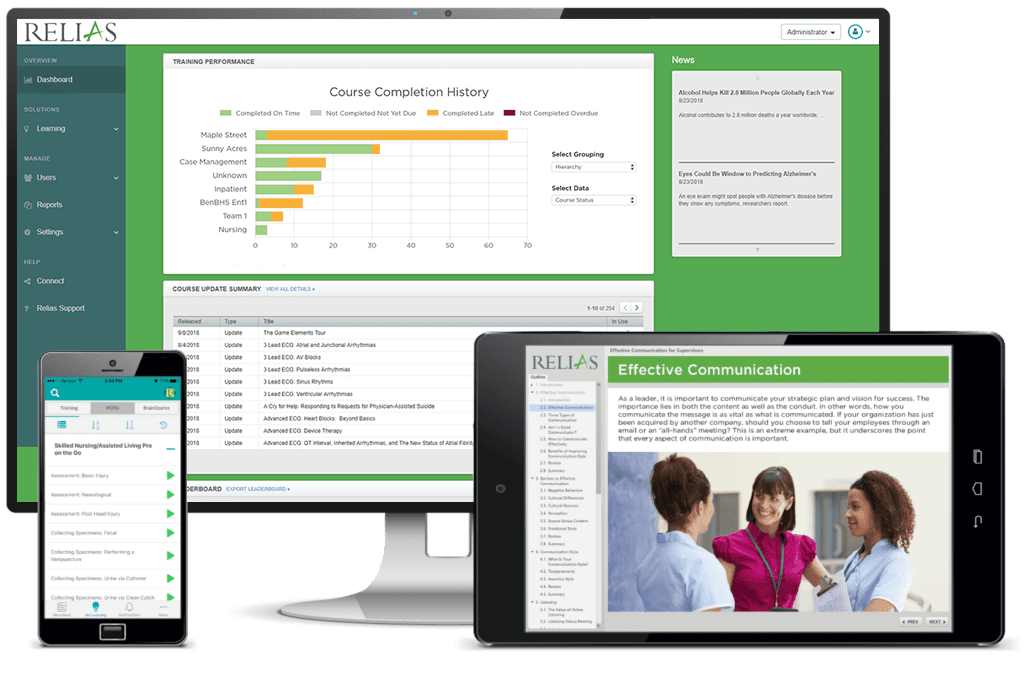

2. Docebo
- G2 Rating: 4.3/5
- Pricing: Pricing is available upon request.
Docebo serves mid-to-large healthcare organizations that either have a large staff or are scaling up rapidly. While it’s not a healthcare-specific LMS, it does have healthcare-specific courses in its library – so let’s call it hybrid LMS between being generalized and healthcare-specific.
Features of Docebo include:
- AI-powered content curation and recommendations.
- Social learning and gamification features.
- Mobile learning capabilities.
- Scalable cloud-based architecture.
- Comprehensive analytics and reporting tools.


3. Absorb LMS
- G2 Rating: 4.4/5
- Pricing: Pricing available upon request.
Absorb is a cloud-based enterprise learning platform that empowers healthcare organizations to train their clinicians, track performance with intelligent reporting, customize learning experiences with personalized learning paths and complete the loop with tests and assessments.
Features of Absorb LMS include:
- Intuitive user interface and dashboard.
- Strong support for blended learning.
- Advanced reporting and analytics.
- Mobile-friendly design.
- Built-in course authoring tools.
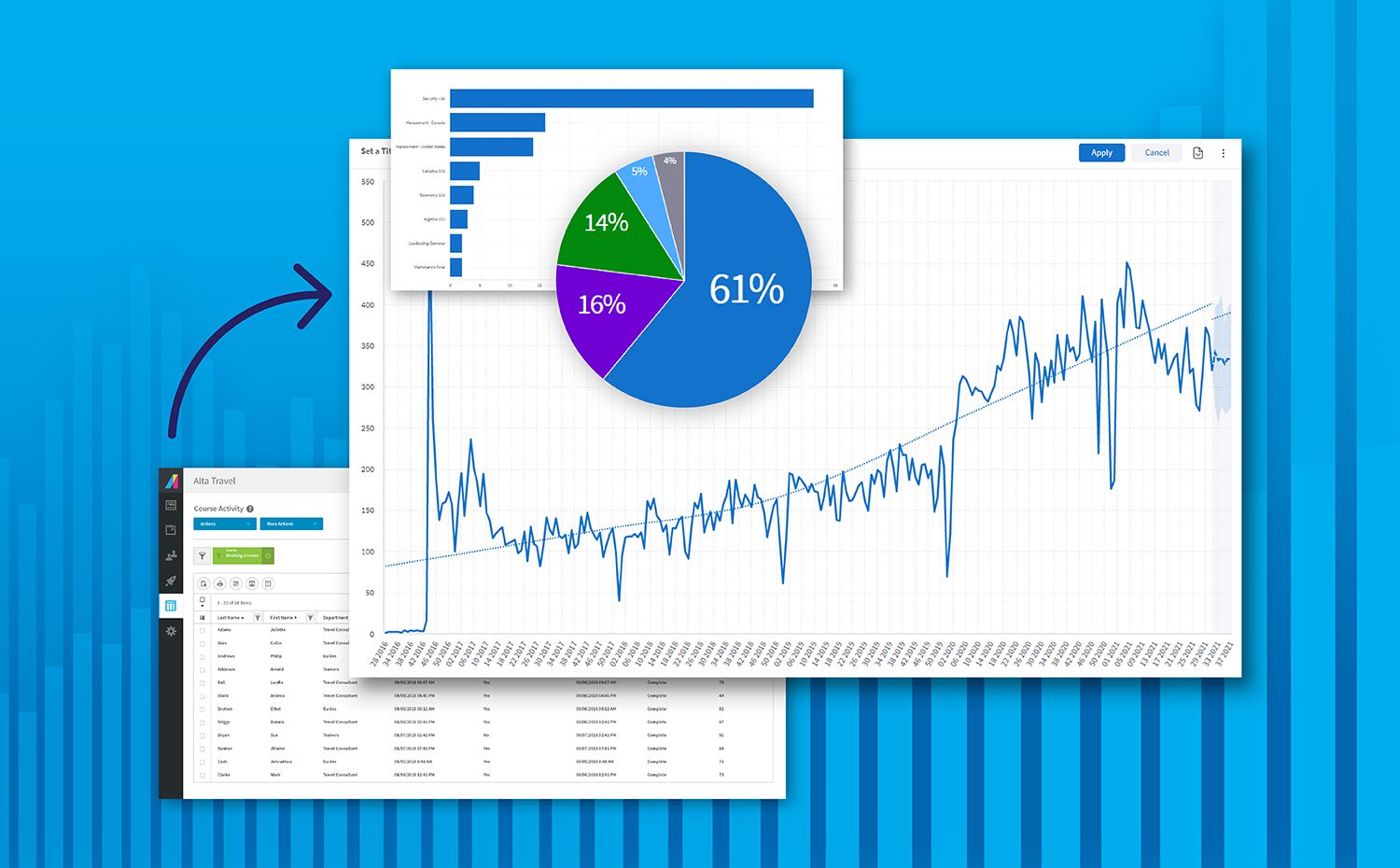
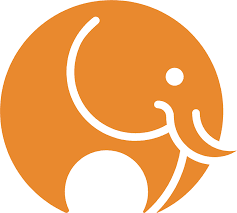
4. Tovuti LMS
- G2 Rating: 4.8/5
- Pricing: Starts at approximately $775 per month.
Tovuti is an on-demand learning management system that offers a simple way for hospitals to create courses, engage their clinicians, train teams, and assess their development. Tovuti has advanced tracking and reporting features that make it easy to monitor courses completed (and by whom) and certificates awarded and segment them by individuals.
Overall, if you’re looking for a strong product core with few bugs and a great UX, Tovuti should be at the top of your list. But, Tovuti seems more like a generalist solution that’s not designed with medical practices in mind: it doesn’t offer rich content libraries like Relias and Docebo & you have to bring your content over, which is frankly impossible, mainly if your training program depends on native content.
Features of Tovuti LMS include:
- Interactive learning with quizzes, surveys, and discussions.
- Integrated webinar tools.
- Custom branding options.
- Social community features for learner engagement.
- Mobile access and offline learning capabilities.

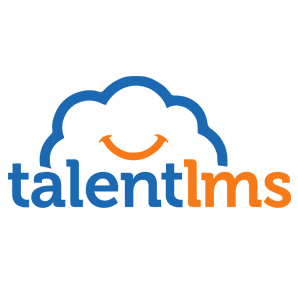
5. TalentLMS
- G2 Rating: 4.7/5
- Pricing: Free version available; paid plans start at $59 per month.
TalentLMS is a flexible LMS platform designed to help organizations build their curriculum, import existing content (from YouTube, Prezi, cmi5, xAPI, or SCORM files), test learners, push learning programs customized for specific roles, and localize your learning interface for users across 30+languages.
However, unlike Relias & Docebo which are tailor-made for physicians and come pre-loaded with thousands of medical courses & certifications, TalentLMS requires you to bring your content, which might not be feasible for many large hospitals.
Features of TalentLMS include:
- Easy-to-use interface.
- Extensive customization options.
- Automation features for user management.
- Support for multiple languages.
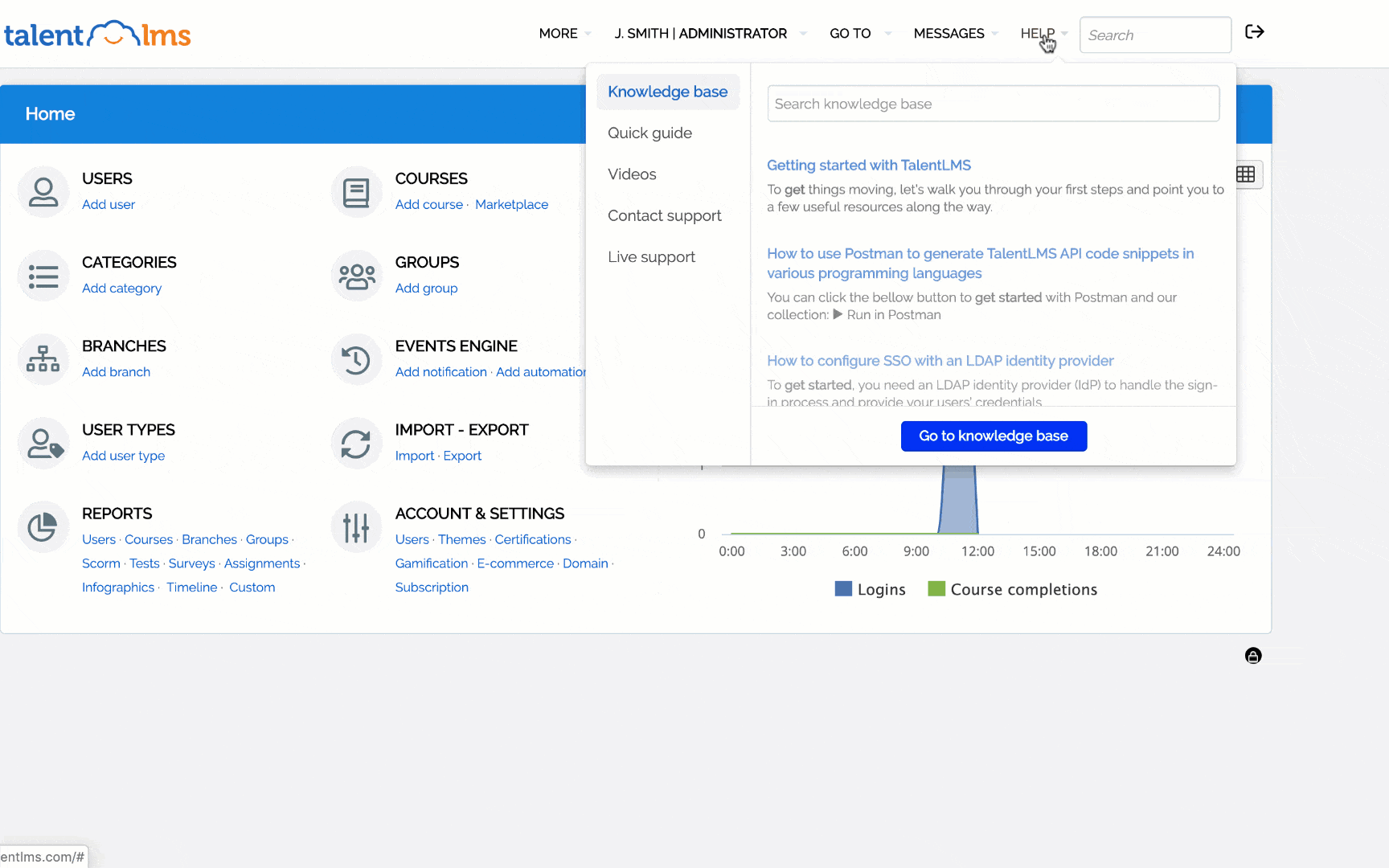
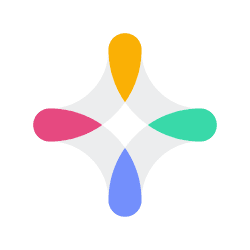
6. Trakstar Learn
- G2 Rating: 4.3/5
- Pricing: Custom pricing based on the number of users.
Trakstar offers a lite healthcare training experience for organizations that want to build a curriculum quickly, educate their employees on the go, assess trainees with flexible test types, and maintain a performance database where you store archived courses and completion records.
Notice the word we used up there: Trakstar is lite because it’s a passable training tool, offers learners and admins a seamless experience, and lets you bring over your SCORM files, PDFs, Word docs, voiceovers, videos, etc., but it doesn’t have an exhaustive content library that deals with specific medical issues, and you have to build yours from scratch.
Features of Trackstar Learn include:
- Personalized learning experiences.
- Real-time feedback and assessments.
- Seamless integration with existing HR systems.
- Customizable reporting and analytics.
- Mobile learning support.
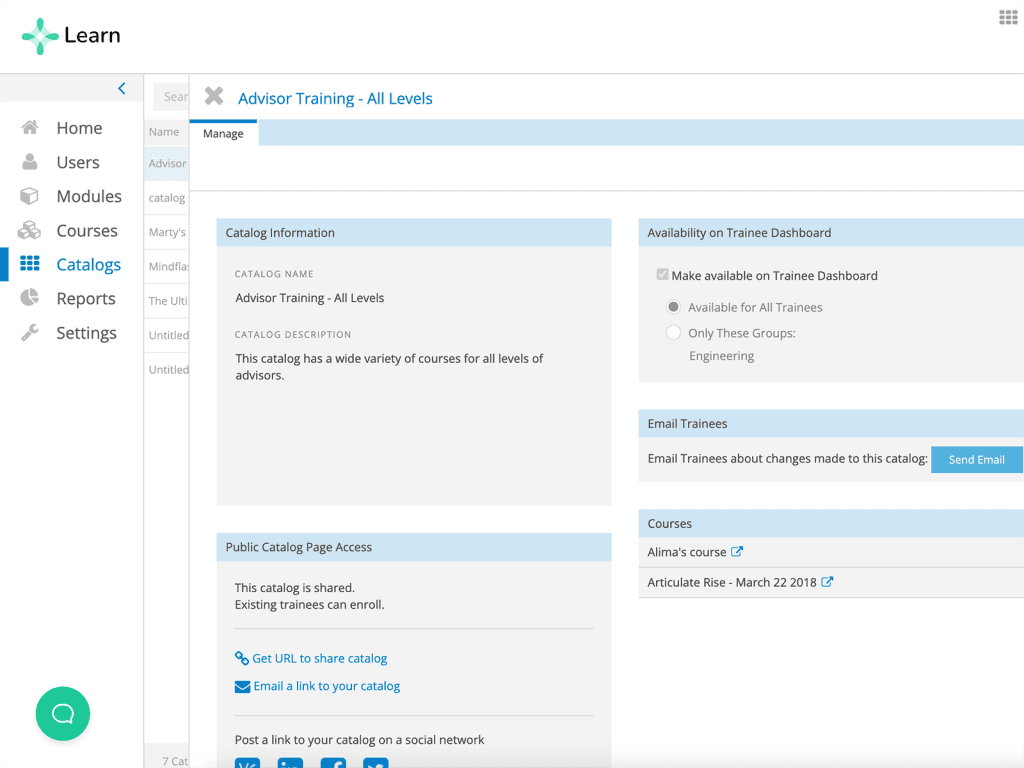
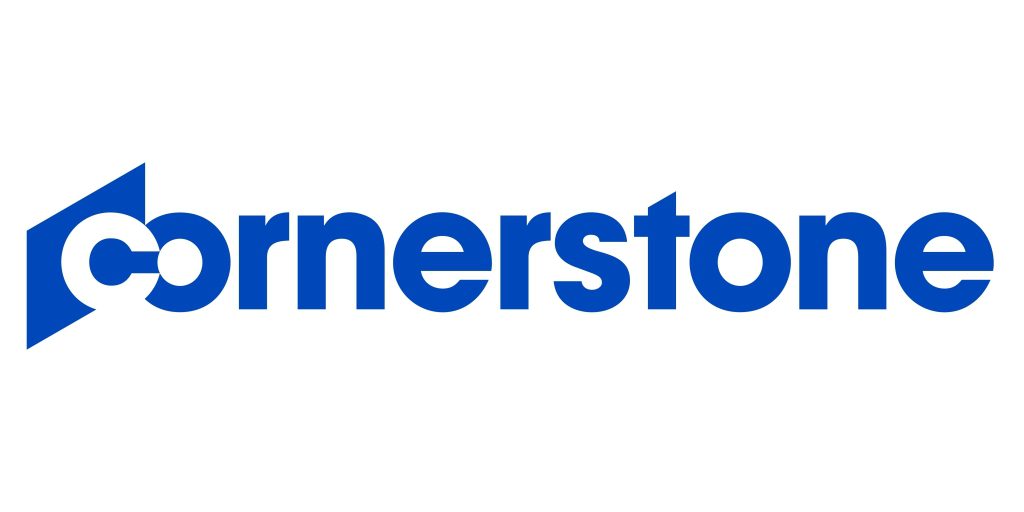
7. Cornerstone Learning
- G2 Rating: 4.2/5
- Pricing: Pricing available upon request.
Cornerstone is an all-in-one LMS for on-demand training, coaching, and assessment. It’s designed to integrate with third-party tools so employees can access training resources via Teams, Slack, etc. Cornerstone helps you track performance with engagement surveys and HR analytics and supports multiple resource formats.
Features of Cornerstone Learning include:
- Extensive course library with healthcare-specific content.
- Compliance management.
- Predictive and prescriptive learning recommendations.
- Mobile learning and on-the-job training tools.
- Advanced reporting and analytics features.


8. HealthStream Learning
- G2 Rating: 3.8/5
- Pricing: Pricing available upon request.
Healthstream’s LMS helps healthcare organizations develop programs their staff can access across channels, track performance with a robust tracking and analytics feature; and recognition programs for highlighting staff achievements.
Features of HeathStream Learning include:
- Compliance tracking and reporting.
- Competency and credential management.
- Assessment and surveys for performance tracking.
- Simulation-based training modules.
- Integration with clinical performance evaluation tools.
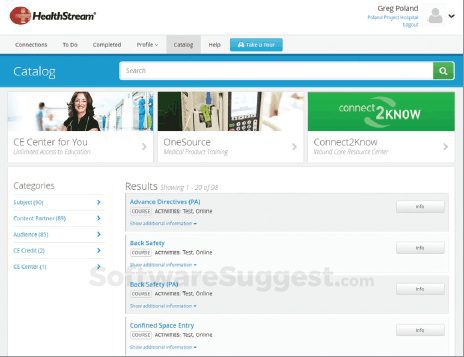

9. EthosCE LMS
- G2 Rating: 4.5/5
- Pricing: Custom pricing based on organization needs.
EthosCE targets medical associations, university hospitals, health systems, and medical education companies that want to build continuing education programs to keep training their staff and refreshing their skills.
Ethos offers a customizable reporting dashboard that gives you critical details at a glance, including course enrollments, credit awards, demographic breakdowns, etc. Using Ethos, you can create and deliver any type of credit (e.g., CEUs, SNE, CPE, etc.), import, create, and edit courses, enable trainees to learn at their own pace, auto-generate certificates, and map your curriculum to regulated training standards.
Features of EthosCE include:
- State-specific compliance training.
- Mobile-friendly courses.
- Progress tracking and reporting.
- Automatic course updates.
- Easy enrollment and management.

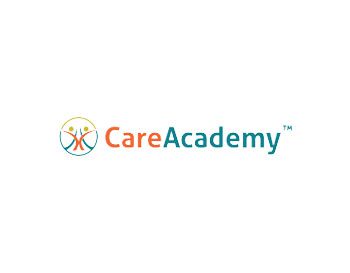
10. CareAcademy/5
- G2 Rating: 4.7
- Pricing: Pricing available upon request.
CareAcademy provides a robust and user-friendly online training solution specifically designed for home care and healthcare agencies. It specializes in compliance and caregiver education, ensuring that healthcare professionals are up-to-date with the latest practices and regulations. CareAcademy’s platform is distinguished by its ability to customize training paths according to specific state regulations and individual job roles, making it an excellent tool for agencies operating across multiple states. Additionally, its intuitive dashboard allows managers to easily track progress, schedule training, and ensure compliance for their entire team.
Features of CareAcademy include:
- State-specific compliance training.
- Mobile-friendly courses.
- Progress tracking and reporting.
- Automatic course updates.
- Easy enrollment and management.
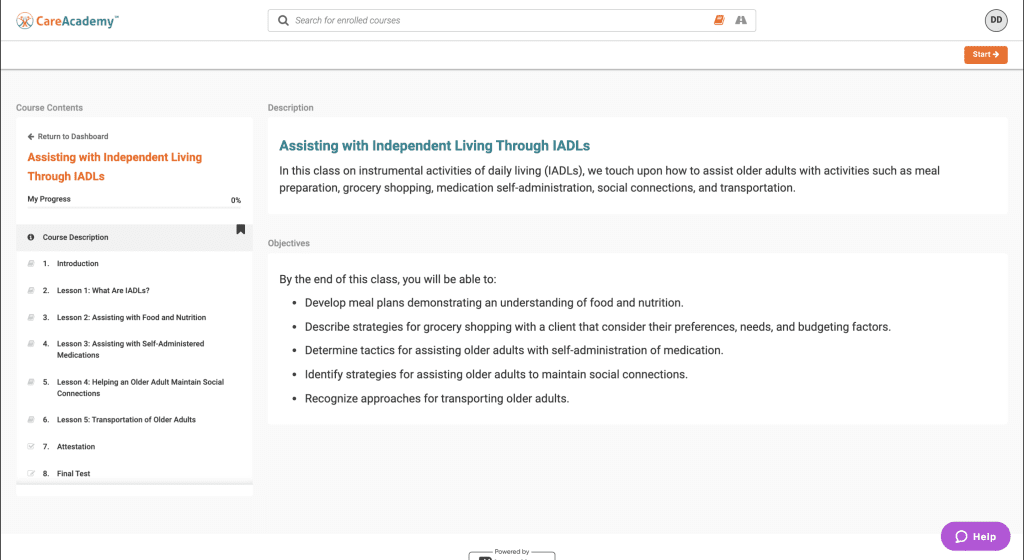
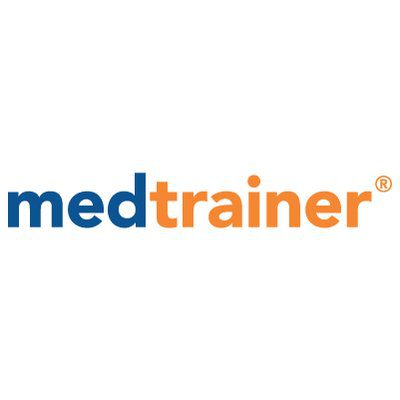
11. MedTrainer
- G2 Rating: 4.5/5
- Pricing: Custom pricing based on organization needs.
MedTrainer simplifies healthcare compliance, training, and credential management through an all-in-one platform that caters to the unique needs of healthcare facilities. This LMS helps streamline the management of complex healthcare compliance requirements with tools for creating and managing safety plans, managing credentials, and conducting risk assessments. Its comprehensive learning suite includes a vast library of courses covering everything from OSHA compliance and HIPAA regulations to infection control, designed to ensure that healthcare providers meet both legal requirements and best practices for patient care.
Features of MedTrainer include:
- Integrated compliance management.
- Credentialing and document management.
- Safety plans and incident reporting.
- Extensive healthcare compliance library.
- Easy-to-use learning management system.
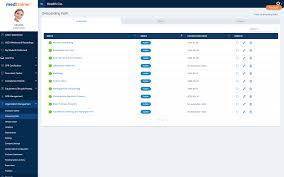
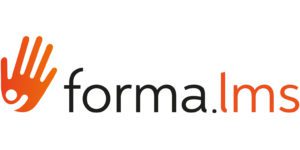
12. Forma LMS
- G2 Rating: 4.2/5
- Pricing: Free open-source; professional services available for a fee.
Forma LMS is an open-source, flexible learning management system that offers an economical yet powerful solution for training and development needs in various sectors, including healthcare. Being open-source, it allows organizations complete control to customize and scale their e-learning environments according to specific requirements.
Forma LMS supports a wide range of content types and advanced features like social learning, web conferencing, and multimedia integration. Its strong community support and modular design make it particularly attractive for those who want a tailored training solution without significant ongoing licensing costs.
Features of Forma LMS include:
- Free and open-source platform.
- Extensive customization capabilities.
- Integration-friendly architecture.
- Scalable to any organization size.
- Supports multimedia content and web conferencing.
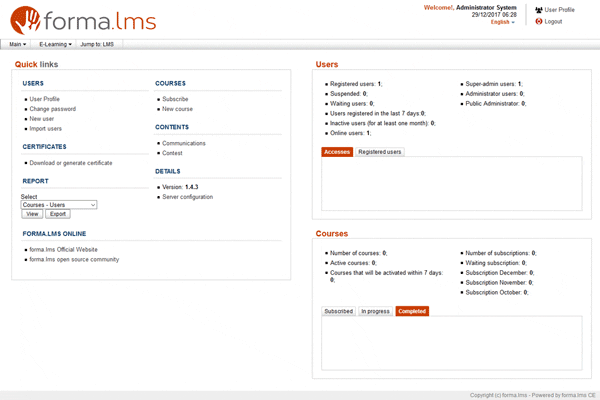
Features of a Healthcare Learning Management System
Here are a few features that enable healthcare LMS platforms to deliver training content, engage clinicians, and track their performance.
- Multichannel support: Healthcare LMS tools provide learning content via mobile (smartphones & tablets) and desktop devices, and across platform types such as iOS, Windows, Android, etc.
- Multiformat content: Healthcare learning management systems enable hospitals to enrich their learning and training with eCourses, videos, text, audio, PowerPoint files, PDFs, and more, enabling a multimodal learning strategy.
- L&D analytics: With a healthcare LMS, hospitals and offices can track course completion, onboarding progress, compliance completion, and more. An LMS empowers healthcare providers with training analytics that filter down to individuals to see individual quiz scores, certificates, completed courses, and more to measure training effectiveness.
- User management: Add and edit users, assign them roles, combine them into groups, and assign learning paths and assignments to groups or departments.
- LMS integrations: Integrate with third-party tools applications or build custom add-ons with APIs, such as your EHR software, healthcare CRM, and patient portal, to provide contextual, in-app learning experiences.
- Customizations: Design your learner dashboards and screens with a drag-and-drop builder.
Use Cases Of Healthcare LMS
Here are some of the most common use cases of healthcare LMS
1. Compliance training
Maintaining compliance with ever-evolving laws and regulations is critical in the highly regulated healthcare industry. An LMS helps ensure that all healthcare staff are up-to-date with mandatory compliance training related to HIPAA, patient privacy laws, workplace safety, and other regulatory requirements.
For example, a hospital can use an LMS to deliver and track the completion of annual compliance courses required by federal or state health authorities, ensuring that all personnel meet the necessary standards and the institution avoids potential legal penalties.
2. Clinical skills development
Continual enhancement of clinical skills is vital for healthcare providers to keep pace with advancements in medical procedures and technologies. An LMS facilitates this ongoing professional development by providing modules on new treatment protocols, surgical techniques, or the use of new medical equipment.
For instance, a clinic might offer training on the latest non-invasive cardiac procedures, enabling cardiologists and support staff to enhance their expertise and improve patient outcomes.
3. Onboarding new staff
Onboarding new healthcare employees is a complex process, requiring them to understand many standard operational procedures and healthcare practices quickly.
An LMS streamlines the onboarding process by providing standardized training modules that new hires can complete at their own pace, covering everything from hospital protocols and safety procedures to patient handling techniques.
This not only speeds up the onboarding process but also ensures consistency in training delivery, which is crucial for maintaining high standards of care.
4. Patient education programs
Educating patients about their health conditions, treatment plans, and preventive care can significantly improve health outcomes and reduce readmission rates.
Healthcare LMSs can be used to create accessible educational content for patients, such as instructional videos on managing chronic diseases or interactive modules on post-operative care. This approach allows patients to engage with their health management actively, providing them with the tools to manage their conditions effectively at home.
5. Certification
Healthcare professionals often need specific certifications to practice or to specialize further, such as Advanced Cardiac Life Support (ACLS) or Pediatric Advanced Life Support (PALS). An LMS serves as a platform where healthcare workers can prepare for these certifications through study materials and practice exams.
Additionally, the LMS can host certification courses directly, enabling staff to complete necessary coursework and examinations within the system, streamlining the certification process, and keeping credential records easily accessible for both the employee and employer.
6. Training staff on new software
As healthcare providers undergo digital transformation, it means integrating core, mission-critical software into their operations and business processes that they rely on for day-to-day operations.
An LMS can help deliver and track pre-recorded videos and modules that provide traditional training to healthcare employees on how to use a new system, like an EHR software, a patient billing software, a medical sales CRM, etc.
However, LMS platforms don’t engage employees, providing only static training lessons and resources inside its learning portal platform.
With a DAP like Whatfix, healthcare providers can create hands-on, interactive, in-app experiences for their healthcare staff that guide employees through healthcare software and business processes. This enables employees to maximize their efficiency, be supported in the flow of work, and drive healthcare transformation adoption.
For example. Healthcare provided Shield Healthcare partnered with Whatfix to support its healthcare workers on its new Core2 in-house development
For instance, when Shield HealthCare developed its new custom patient billing solution Core2, it partnered with Whatfix to accelerate migration to the new system by providing in-app guidance to its employees in the flow of work.
This enabled Shield to quickly adopt the new system into its core workflows without downtime, and support its healthcare workers on using it correctly and proper billing knowledge with in-app support.
“With such a fast-paced work environment, having a training tool like Whatfix where users don’t have to leave the application to get the help they need, makes such a difference,” said Michelle Norwood, Corporate Training Specialist at Shield Healthcare.
Whatfix supplemented its existing live training sessions and empowered its various business units to quickly attain Core2 proficiency – helping to achieve ROI from its transformation, drive operational efficiency, and enable its employees to maximize their productivity.
“Not having a DAP would slow down time-to-proficiency, as every time an end-user had a question or were trying to figure out how to do a process, they’d have to leave Core2 to find that answer,” said Ryan Moscoe, Sr Training Specialist at Shield Healthcare.
Software clicks better with Whatfix's digital adoption platform
Enable your employees with in-app guidance, self-help support, process changes alerts, pop-ups for department announcements, and field validations to improve data accuracy.
What Makes a Healthcare LMS Unique vs. a Traditional LMS?
1. Access to a dedicated medical curriculum
Healthcare LMS platforms often come preloaded with a dedicated medical curriculum tailored to the specific needs of healthcare professionals. This includes a wide range of clinical and non-clinical training content—from patient care and medical procedures to hospital administration and healthcare law.
Unlike traditional LMSs that may offer a broad spectrum of courses suitable for various industries, a healthcare LMS provides specialized content that is directly applicable to medical settings, ensuring that healthcare workers receive training that is relevant and immediately applicable to their roles.
2. Compliant learning resources
The healthcare industry is heavily regulated, and compliance with legal, professional, and ethical standards is crucial. Healthcare LMSs are designed to provide learning resources that meet these stringent requirements. This includes courses that are regularly updated to reflect the latest healthcare regulations and best practices, such as HIPAA in the U.S., GDPR in Europe for data protection, or specific clinical guidelines issued by health authorities. These platforms ensure that all training materials adhere to current standards, helping healthcare organizations maintain compliance and avoid potential legal issues.
3. Integration with healthcare systems
A healthcare LMS uniquely integrates with other critical healthcare IT systems, such as Electronic Health Records (EHR), practice management systems, and clinical information systems. This integration facilitates seamless communication between training modules and operational systems, enhancing the learning experience by providing real-world data and scenarios.
For example, an LMS might pull anonymized patient data from an EHR to create realistic simulations for training purposes, providing learners with practical, hands-on experience in a controlled environment.
4. Accomodation of various professional roles
Healthcare organizations comprise a diverse array of professional roles, each with specific training requirements. Healthcare LMSs are uniquely designed to accommodate this diversity, offering tailored training pathways for different roles within the healthcare ecosystem. Whether it’s training for surgeons, nurses, hospital administrators, or janitorial staff, each pathway is crafted to address the unique responsibilities and compliance requirements of these roles. This level of customization ensures that all staff members receive relevant and effective training that enhances their skills and knowledge pertinent to their specific functions.
The combination of Digital Adoption Platforms (DAP) and Learning Management Systems (LMS) presents an unparalleled solution for enterprise healthcare providers and hospital networks aiming to enhance their operational efficiencies and improve patient outcomes.
By integrating a DAP such as Whatfix with your healthcare LMS, organizations can streamline their learning process, ensuring that staff are not only trained effectively but also supported continuously as they apply their knowledge in real-world scenarios.
With a DAP, you can enable your healthcare workers and support them in the flow of work with the following features:
- Provides step-by-step walkthroughs and guided product tours of healthcare software, applications, workflows, tasks, and processes in your EHR, medical billing, insurance, patient management, and other software systems.
- Provides on-demand self-help support widgets where learners can access product documentation, videos, training content, and tutorials right inside your EHR or any digital application – providing support to employees where ever they are.
- Nudges users to complete courses and certifications with in-app alerts, beacons, smart tips, notifications, and more.
- Displays contextual learning experiences and content with user segmentation and triggers.
- Drive awareness of compliance law changes, upcoming deadlines, process changes, application updates, and more with in-app Pop-Ups.
- Collects user feedback with in-app Surveys
- Analyze content experience and usage to improve your in-app guidance and to tackle friction areas.
Ready to get started? Request a Whatfix demo!
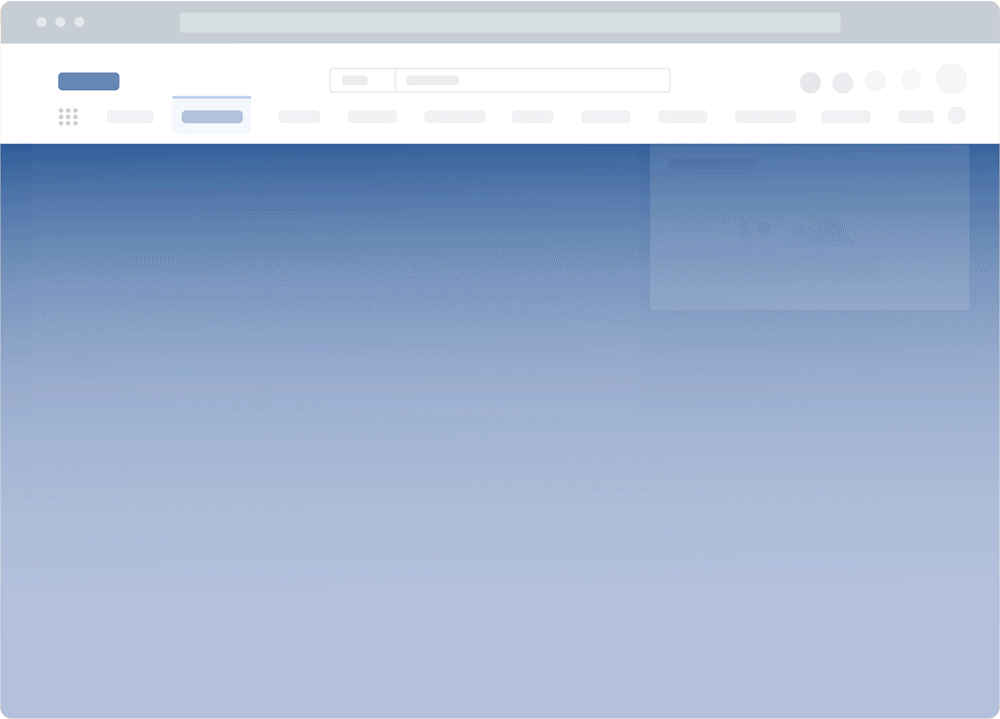
Ready to learn more about healthcare transformation and technology adoption? Check out these related resources:
Thank you for subscribing!
